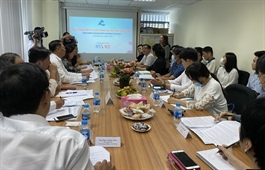Hopes escalating for post-pandemic growth in M&A
Hopes escalating for post-pandemic growth in M&A
Vietnam’s mergers and acquisitions, though rather muted in the beginning months of 2021, are expected to revive on the back of both vaccination programmes and legislative changes.

Hopes escalating for post-pandemic growth in M&A
|
Vietnam has witnessed only a few merger and acquisition (M&A) deals since the beginning of 2021. Thailand’s SCG acquired 70 per cent stake in Duy Tan Plastics while Danish group BioMar scooped up a majority share in Viet-Uc.
Commenting on this trend, Masataka Sam Yoshida, head of the Cross-border Division of RECOF Corporation, said that this situation is just temporary, and a bright future is expected ahead. For instance, Japanese investors have become more cautious than ever after the latest wave of the pandemic in Japan.
Vietnam has been extremely successful in keeping the pandemic under control, but the strict travel restrictions make it difficult for Japanese companies to arrange short-term business travels, which are fundamental and crucial in considering and proceeding with M&A transactions. “Having said that, the rationale for the investment in Vietnam has not changed. Vietnam has much higher growth potential than Japan where the economy is too mature. We are aware that Japanese companies remain interested in Vietnam, even though they are not active at this moment,” he said.
According to RECOF’s M&A database, the number of outbound transactions from Japan decreased by 33 per cent to 557 transactions in 2020, while the same number in Vietnam declined by 30 per cent to 23. Vietnam ranked sixth as the destination country for Japan among all countries worldwide, and second only to Singapore in Southeast Asia.
Yoshida added, “COVID-19 has been the sole reason for the recent sluggish M&A transactions between Vietnam and Japan, so assuming the COVID-19 will be subdued with the start of vaccinations and the removal of travel restrictions, we are more than confident that the market will recover in the latter half of 2021.”
Meanwhile, Vo Ha Duyen, chairwoman of Vietnam International Law Firm, cited data by the Corporate Investment and Mergers & Acquisitions Center showing that the value of M&A deals in Vietnam in 2020 dropped by about a half from 2019. Various factors may have affected such activities, she said – the pandemic has had a significant impact on the global economy and also caused difficulties to dealmaking, while travel bans and lockdowns have hampered M&A due diligences and negotiation meetings.
According to Duyen, the ongoing changes to the laws of Vietnam have also contributed to some uncertainties. Under the new Law on Competition, a substantially higher percentage of M&A deals are subject to merger control filing requirements than under the old laws. Investors initially hoped that the introduction of the 30-day “preliminary review” track to the merger control filing procedure under the new law would help reduce procedural burdens.
Nonetheless, because sub-law regulatory guidance has not been issued, it seems that a majority of filing cases have not seen application of the 30-day preliminary review and have been subject to complex and uncertain evaluations which last for months.
In addition, local departments of planning and investment have had difficulties in applying the new Law on Investment as documents guiding the implementation of the law have not been issued. This could increase cases in which the licensing authorities have to seek opinions from other relevant authorities, which may contribute to delays in the M&A process.
“We hope that new decrees and circulars providing detailed and favourable regulatory guidance will be issued soon to support the competition and investment authorities in dealing efficiently with M&A transactions and to effectively reduce the time gap and uncertainties in the procedures, helping boost the recovery of M&A activities when the pandemic settles down,” Duyen said.
According to Vietnam M&A Forum Research Team, a number of mega deals are expected to be secured in 2021. Foreign investors from South Korea, Japan, Singapore, and Thailand will continue to dominate the market with the value of deals reaching up to $500 million. At present, Vietnam’s M&A market remains attractive to investors despite the impact of the global health crisis – in particular, in the second and third quarter of 2020 Vietnam witnessed more M&A deals after the country successfully contained the summer wave of infections.
That being said, Vietnam is hopeful about potential for post-pandemic M&A growth. Some experts have forecast that the main sectors that will contribute to the recovery of value in Vietnam are telecommunications, energy, infrastructure, pharmaceuticals, education, and e-commerce.
Yoshida from RECOF said that Japanese companies are concerned with stability of global supply chains. Vietnam is not only competitive as a location for manufacturing, but also it stands at the crossroads in terms of free trade agreements with major economic zones and so is well positioned.
“Additionally, more Japanese companies are paying attention to sustainability and technology innovations, and they are eagerly looking for opportunities to apply their expertise, such as in renewable energy, smart cities, AI, and more in Vietnam, where the people are open to new ideas,” he said. “As for the pandemic, we highly evaluate Vietnam’s success in keeping the pandemic under control, and this fact makes the country even more attractive for the Japanese investors.”





















